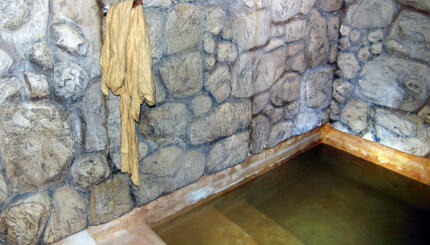Jewish camp is everywhere, Terry Gross confirmed on NPR the other day. While interviewing filmmakers Joel and Ethan Coen, she noted that she’d recently discovered that the Coen Brothers had attended the same Jewish camp – Herzl Camp, in Wisconsin – as folk icon Bob Dylan, albeit not at the same time. An excerpt from the interview follows:
GROSS: So I have to know, is this the kind of summer camp where you sing songs with lyrics about how great the camp is, and then there’s team songs with how great the team is?
COEN: No.
GROSS: Aw, shucks. I wanted to think of [Dylan] as singing those songs.
COEN: No, you sang – it was Zionist summer camp, and you sang Zionist songs in Hebrew.
Those of us who attended similar camps recall similar activities. Personally, I can’t even read these lines of the interview without involuntarily breaking into ‘Mi anachnu? Anachnu tziirim! Sharim doo wa diddy diddy dum diddy doo!’ Sad, but true.
That overnight camp comes with a form of indoctrination shouldn’t surprise anyone – but in my experience, both as a Jewish camp camper and a Jewish camp parent, I’ve found that it’s less “indoctrination” and more “immersion.”
Camp is a time for children to be separated from their parents – let’s call them the Indoctrinators-in-Chief – and to be submerged in a world unto themselves for the first time. This is an inherently heady experience. For many children, it’s their first substantial time away from ‘home’ in a place that is not a family member’s home. Campers find themselves in a new place, where things are done differently. And without their parents at hand, they look to other sources – counselors, fellow campers, and the camp itself – as guideposts of authority, and as compasses to provide direction.
The world of each camp is carefully curated in order to convey a particular message and meaning. Some sports camps are known as fostering a spirit of camaraderie and teamwork; others are notorious for being intensely competitive. Performing arts camps fairly vibrate with the sense that there is nowhere more worthwhile than the stage. More general arts camps convey the worthiness of aggressive individuality with their free-to-be-you-and-me, anything-goes wild sense of creativity.
And yes, Jewish camps focus on being Jewish. And whether that is being Jewish as manifested by
davening
(praying) three times a day, by performing “Ata Ish Tov, Charlie Brown” in Hebrew or by learning about Israel as the homeland of the Jewish people, a Jewish camp has as its baseline assumption the validity and continuation of the Jewish people.
So yes, Jewish camps are Zionistic and pro-Israel. Jewish camp teaches different ways of seeing the world – but those ways are through Jewish lenses and perspectives. I attended camps which made me reevaluate who I was in relation to the Jewish people. Questions, whether about
kashrut
or Israel, were not only tolerated, but welcomed.
Yes, I learned from camp that I was fundamentally, unalterably pro-Israel. But I also learned that ‘Israel’ means ‘to struggle.’ Immersion in a Jewish environment fundamentally differs from indoctrination: Jewish camp, whether through teaching text or history, teaches kids that being Jewish is a struggle, and one to which they should devote their entire lives.



